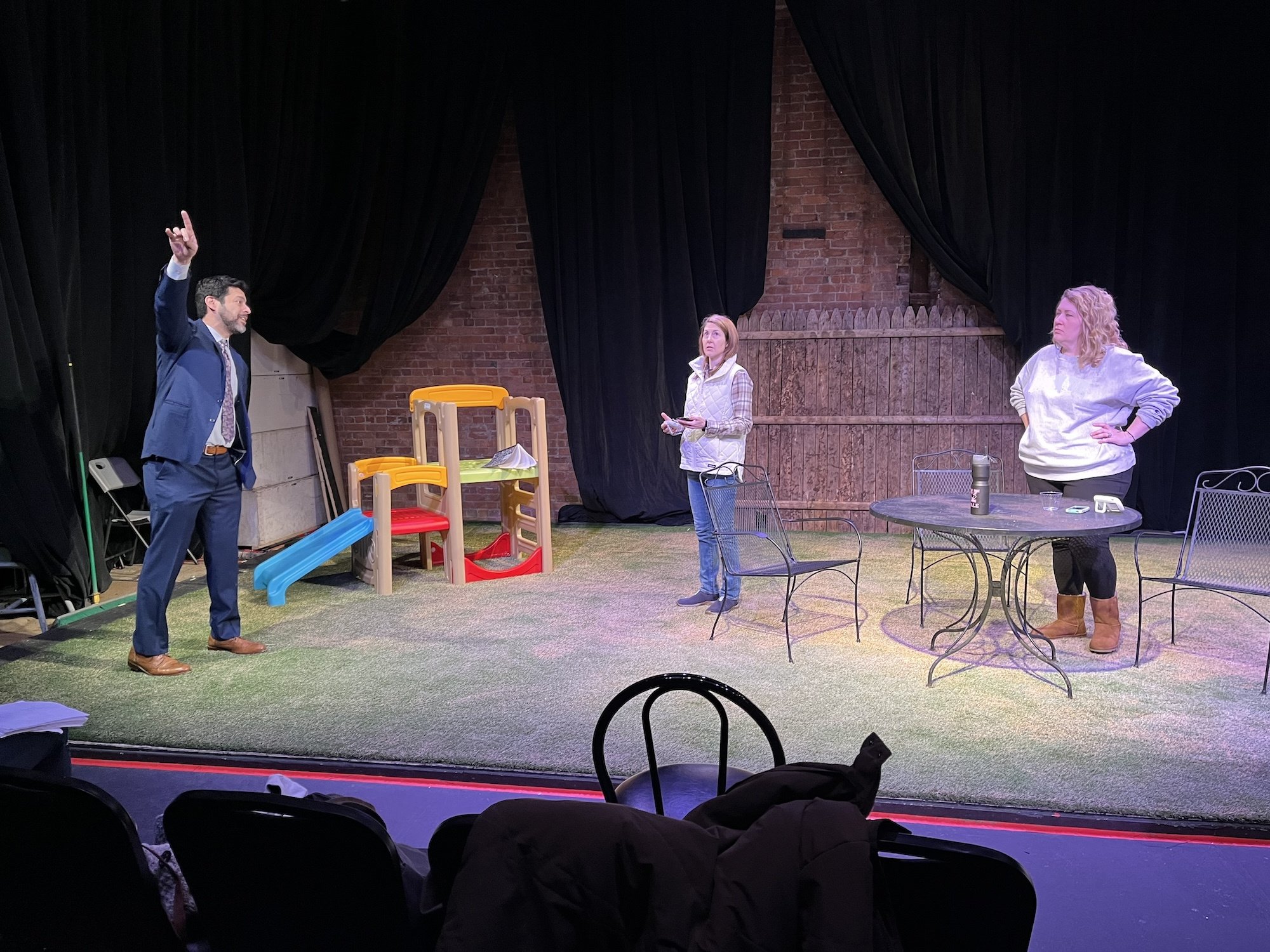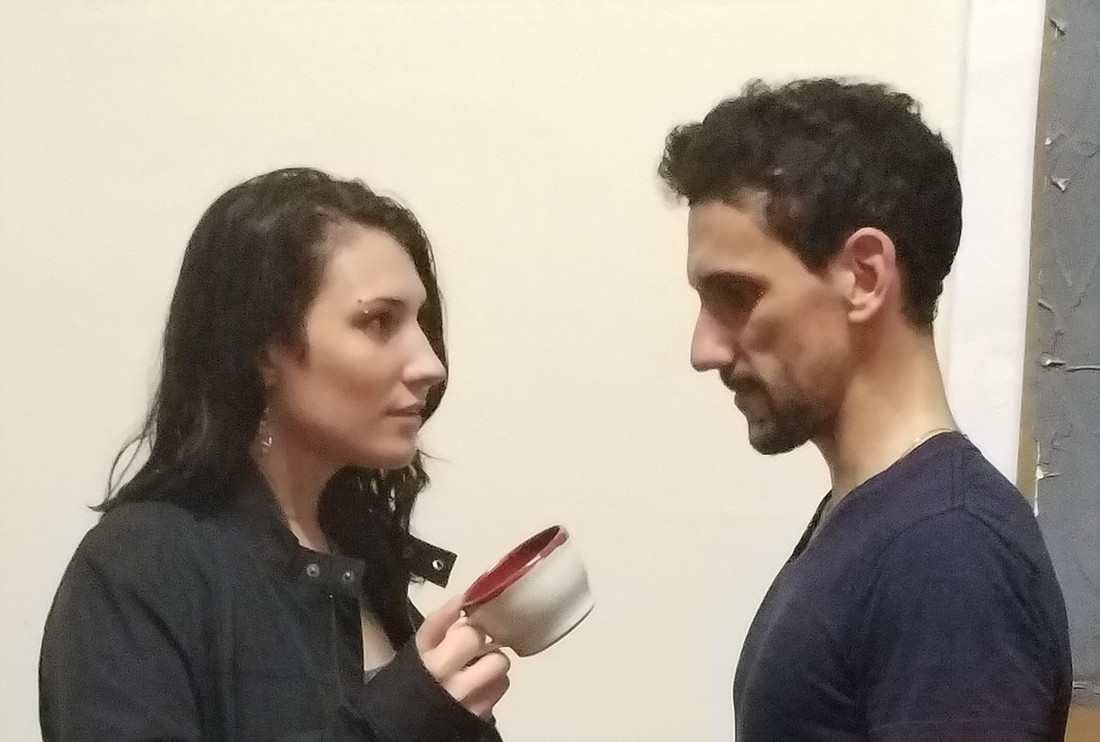Review of Heisenberg, New Haven Theater Company
The latest New Haven Theater Company production Heisenberg, directed by Steve Scarpa with a cast consisting of George Kulp and Melissa Andersen, opened this weekend and plays tonight and next Thursday through Saturday, May 8, 9, 10, only.
The play, by Simon Stephens (perhaps best known for The Curious Incident of the Dog in the Night-time), is engaging, surprising, and ultimately genial and optimistic. It’s not that there’s not a dark side to it all, but Melissa Andersen’s Georgie Burns, as the life force of the play, keeps us, like her stodgy foil Alex Priest (George Kulp), uncertain, fascinated, and vaguely unsettled, never knowing what will come out of her mouth next.
Alex Priest (George Kulp), Georgie Burns (Melissa Andersen) in Heisenberg at New Haven Theater Company, directed by Steve Scarpa
So let’s deal with the “uncertainty principle” right up front. The play is named for Werner Heisenberg, a German physicist who noted that you can’t measure accurately both position and speed of electrons at the same time. As translated into more day-to-day contexts, the Principle has come to be synonymous with the idea that the position/motion of the observer affects the observation. You can’t know what the world actually is until you factor out the distortion your own observations bring to the matter.
Why is this relevant to the play? It seems to me that Stephens wants us to see that someone like Georgie, who is constantly creating fictions about herself—we could also call them lies—is a “particle” we cannot observe properly without some understanding of what it is we think we see from our limited position and our own relative motion. As our stand-in for that process, Kulp’s Priest, an Irishman living in London since his adolescence and a single man with a butcher shop for most of his life (he’s now 75 and thinking of retiring), is laconic, stolid, somewhat distrustful, and, ultimately, more and more receptive.
But what is he becoming receptive to? The notion that a much younger woman—hitting her forties—who spontaneously kisses him on the back of the neck in a train station might actually be a good thing for him. A woman who claims any number of things: she’s an assassin, a waitress, a receptionist at a school; she kissed his neck in memory of a lost husband; she never had children; she never married, but she wants to find out where her grown son is living.
Melissa Andersen’s Georgie is lively, lovely, but also clearly more than a bit damaged. The fact that she’s so verbal is both a come-on and a dodge, a way of keeping as many possibilities in play at once, even in the same sentence. George Kulp’s Alex is an even tougher read: he has the tone of a man not easily impressed nor easily convinced; he’s mostly satisfied with his solitary pursuits—like long walks listening to an infinite variety of musical styles (which he enumerates at one point) on his Walkman. He tells Georgie that the difference between hearing music and listening to it is a matter of thinking about where it’s going, how it’s developing its themes. Which is a nice instruction for following a play as well.
The play is perfect for NHTC, requiring little in the way of set and props, and keeping us focused throughout on the perfectly paced dialogue achieved by this well-meshed cast and director Steve Scarpa (who directed the first show NHTC presented in the theater-space they’ve been in for over a decade). The play works because the oil and water mix of these two characters keeps alive the notion that they may have a special significance for one another—which is easy enough to maintain as there are no other persons in the play for comparison or contrast. Early on, Georgie ascertains that Alex has no one—no living siblings, no close friends, no younger relatives, nor any online life (he’s put off by the fact that he and his butcher shop are Google-able). In other words, he’s the perfect mark for a certain kind of romance-based hustle.
The most relevant uncertainty concerns where these two are headed and how fast: is Georgie simply hustling Alex? Is she genuinely trying to find acceptance or fun or something deeper from this cautious but quite genuine older man? Does she even know? For the issue isn’t only Alex’s uncertainty and ours, there’s a very real uncertainty at the heart of Georgie, who knows all kinds of ways to play with people but seems never quite certain what she’s playing at.
What you make of it all may have a lot to do with where you are in the electron stream of your own limited lifetime, and, for instance, whether 75 years is unthinkably far ahead or around the bend, and 40something an orbital position or receding almost out of sight. The play’s optimism comes from its convincing sense that we often don’t know who we really are or can be. And that’s a good thing.
Heisenberg
By Simon Stephens
Directed by Steve Scarpa
Producer: J. Kevin Smith; Production Stage Manager: Stacy Lupo; Lighting Design: Adam Lobelson
Cast: Melissa Andersen, George Kulp
New Haven Theater Company
May 1-3 & May 8-10, 2025




































